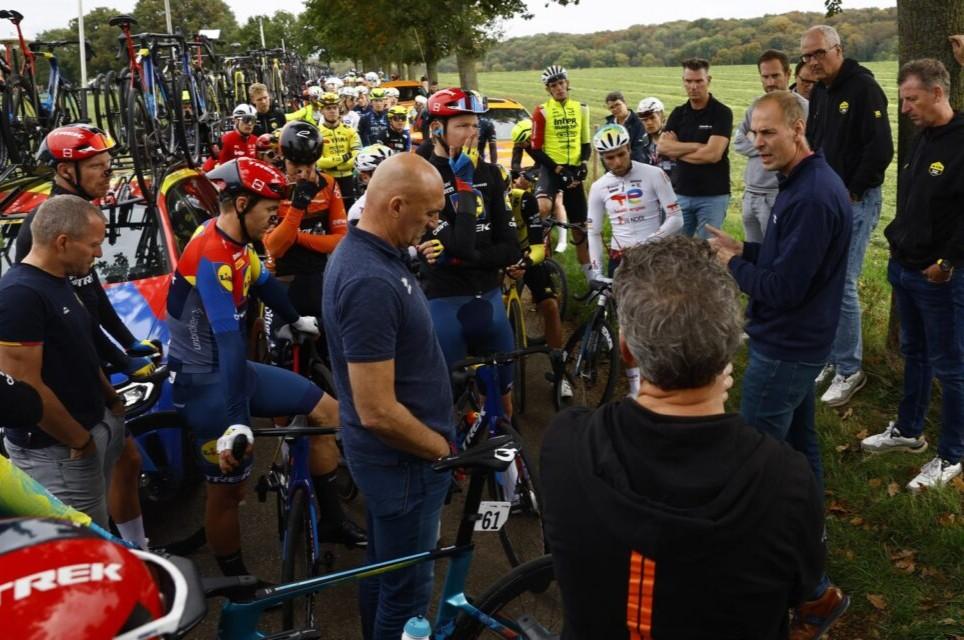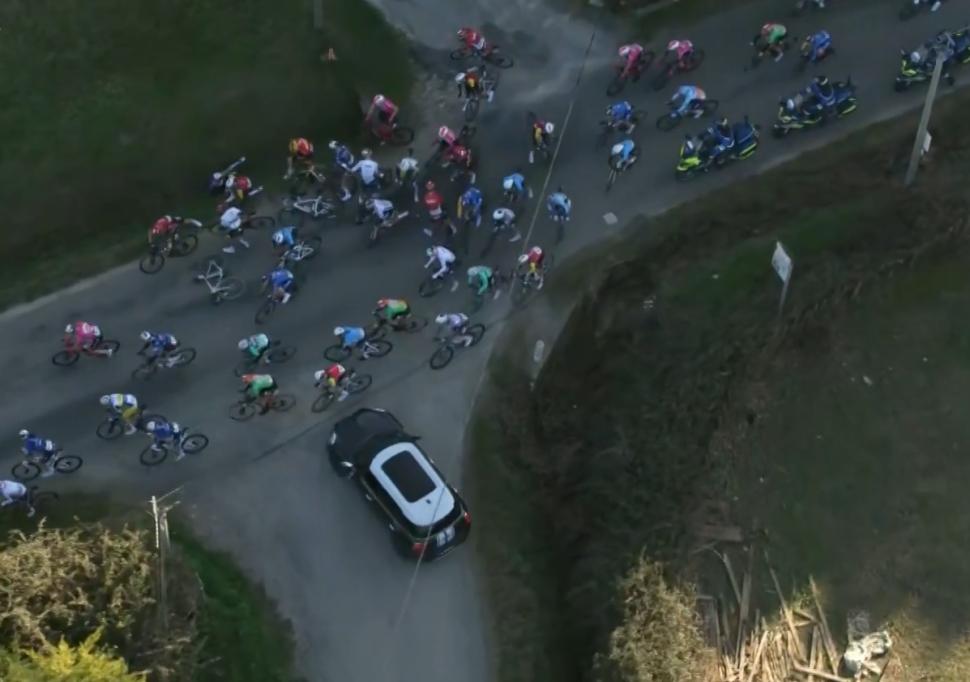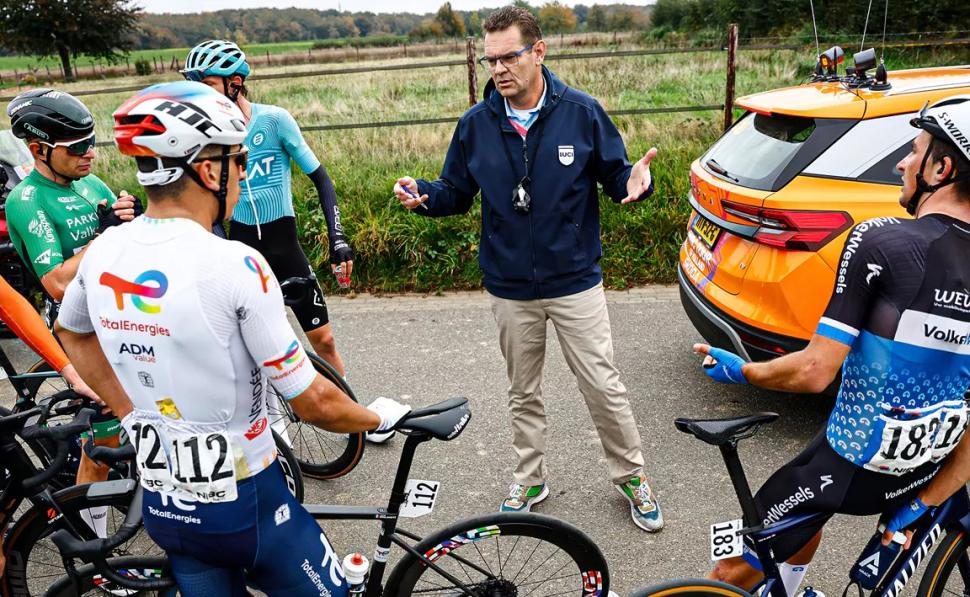The Tour of Holland descended into chaos on Friday afternoon, after an oncoming motorist, seemingly ignoring the warnings of the event’s volunteer marshals, entered the course and drove towards the riders, prompting the peloton to refuse to race and the organisers to cancel the stage.
The incident took place around 30km into today’s third stage of the Tour of Holland, which is appearing on the calendar for the first time in over two decades, in the Limburg region.
According to the race organisers, a car driver was stopped twice by motorcycle marshals from entering the course, but then “chose to ignore” the volunteers before driving towards the riders.
The peloton then stopped on the road and neutralised the race, which is currently being led by Soudal Quick-Step’s British pro Ethan Hayter.
Zeldzame overeenstemming tussen renners, ploegen en organisatie. Thijs Rondhuis gaf net uitleg en bood excuses aan, kreeg daarna applaus van de renners. pic.twitter.com/IejVMVgWmW
— Thijs Zonneveld (@thijszonneveld) October 17, 2025
During discussions with the riders, the organisers admitted that, in the circumstances, their safety could not be guaranteed due to the lack of a police escort, with the revamped race relying on volunteer drivers.
According to Sporza, several riders had ignored these volunteers – who were low in numbers after many failed to turn up – during today’s stage, and during the neutralisation period, more chaos ensued, as a lorry driver also made his way onto the course.
Speaking to the teams and riders on the road, organiser Thijs Rondhuis explained that 25 traffic marshals did not appear when the race was neutralised after the first motorist entered the route.
“That’s why the neutralisation was so chaotic,” Rondhuis said, reports Wielerflits.
“We fully secured the area from kilometre zero. We had several situations where other road users ignored stop signs from traffic controllers. They stopped at the side of the road, then started driving again, stopped again, and then started driving again.
“That’s the sign, that’s the red line, that we can’t do this without police.”
He continued: “For now, the race for the third stage of the Tour of Holland is over. So, we’re stopping for two reasons. One, and that’s by far the most important, is your safety.
“The second is that we must use this situation to ensure we have sufficient police presence in the future to continue organizing races like the Amstel Gold Race, the ZLM Tour, and the Tour of Holland.
“If we don’t, we simply won’t have any more cycling races in the Netherlands. We will therefore seize this opportunity to force the police presence for the future and put it back on the political agenda.”
“Without police, cycling isn’t possible”
Today’s cancelled stage and Rondhuis’ pointed comments about safety come amid increasing concerns from organisers about the lack of police presence at races in the Netherlands.
In recent years, races in the Netherlands have come under increasing pressure due to the limited availability of specialist motorcycle police officers, who play a crucial role in making sure the events pass smoothly and safely.
Since 2018, the number of races that require police escorts have been reduced by over half, with many races opting for smaller, completely closed circuits.
Both the Dutch Cycling Union (the KNWU) and the Association of Cycling Race Organisers (VOW) have previously expressed hope that potential new legislation could allow civilian motorcycle traffic controllers to be deployed at races, to cover for the lack of trained officers.
In 2023, a study was launched and commissioned by the KNWU to evaluate whether civilian traffic controllers could, either completely or partially, take over from police officers at races, while maintaining the events’ existing safety standards.
Published last year, the study – which included a series of pilot schemes during the 2024 season – concluded that civilians could make a “valuable contribution to relieving the pressure on police motorcyclists”, provided they are trained properly, have effective means of communication, and can be clearly recognised.
However, judging by today’s events, those three factors appear to be sorely lacking at the revamped Tour of Holland.
Today’s cancellation means that four days into the race, only one road stage has been completed, after stage one was bookended by a prologue time trial and then a longer race against the clock, both won by Hayter.
 Tour of Holland stage cancelled (credit: Cor Vos)
Tour of Holland stage cancelled (credit: Cor Vos)
However, Rondhuis is optimistic that, with the race passing into the Drenthe region tomorrow, his event can continue to its planned conclusion on Sunday.
“On Saturday, we’ll be riding in Drenthe. There’s a 23-kilometre approach, and after that, we’ll stay in the area around the VAM-berg.
“That ride will be extremely secure thanks to the Motor Begeleids Team Assen. They rode the Elfstedenrace last year and Dwars door Drenthe this spring. I personally guarantee your safety there. On Sunday, we’ll be riding on a closed circuit in Arnhem. I personally guarantee safety there as well,” he told the riders and teams.
“I feel like crying rather than laughing,” he continued. “But the organisers and the teams don’t discuss safety. We tried; I thought it was possible. But it turns out it’s not.
“We had 130 motorcyclists and about fifty traffic controllers on Friday. We’re doing it with almost two hundred people. It just didn’t work out. And then you just have to admit that sometimes things just don’t work out. End of race. We’ll continue on Saturday. And again, guys, apologies!”
In a statement issued following the stage’s cancellation, the Tour of Holland said: “After a turbulent neutralized section, an oncoming car, having been stopped twice, chose to ignore the signal from the motorcycle marshals and continued driving.
“As a result, the riders refused to continue racing. The organisation respects the wishes of the riders and team managers.”
Today’s chaotic scenes at the Tour of Holland, involving members of the public driving into the path of bike races, comes just eight months after the Étoile de Bessèges stage race descended into chaos following a series of similar safety incidents.
 Étoile de Bessèges stopped as riders protest over cars on course (credit: Lotto)
Étoile de Bessèges stopped as riders protest over cars on course (credit: Lotto)
The annual early season stage race, which takes place in the Gard department of southern France, saw motorists driving on the race route, one of which caused a crash, and which led to over half of the teams quitting the race in protest.
During the opening stage, riders were forced to avoid a lorry and several cars that were lined along the road in the final 10km.
And the following day, another motorist strayed onto the route and drove towards the bunch – after reportedly being told twice to leave the course by race officials – before rapidly reversing off the road.
The driver’s actions led to a crash in the peloton as the riders slowed to avoid the motorist, resulting in Red Bull-Bora-Hansgrohe’s Maxim van Gils abandoning the race with injury.
 Driver makes their way onto course, causing crash at Étoile de Bessèges (credit: Eurosport)
Driver makes their way onto course, causing crash at Étoile de Bessèges (credit: Eurosport)
That incident appeared to have sparked a ‘make the race safer or we’ll go home’ narrative from the teams towards the organisers, one that was unfortunately enacted almost immediately the next day, when another seemingly unsuspecting motorist made their way onto the circuit just 12km into the third stage, driving in the opposite direction to the race at a roundabout and almost colliding with the bunch.
The peloton immediately stopped for over an hour as union representatives discussed the seemingly never-ending safety issues with the organisers, eventually leading to a number of teams – including the Ineos Grenadiers, Lidl-Trek, Red Bull-Bora-Hansgrohe, and EF Education-EasyPost – to head back to their buses and quit the race.

